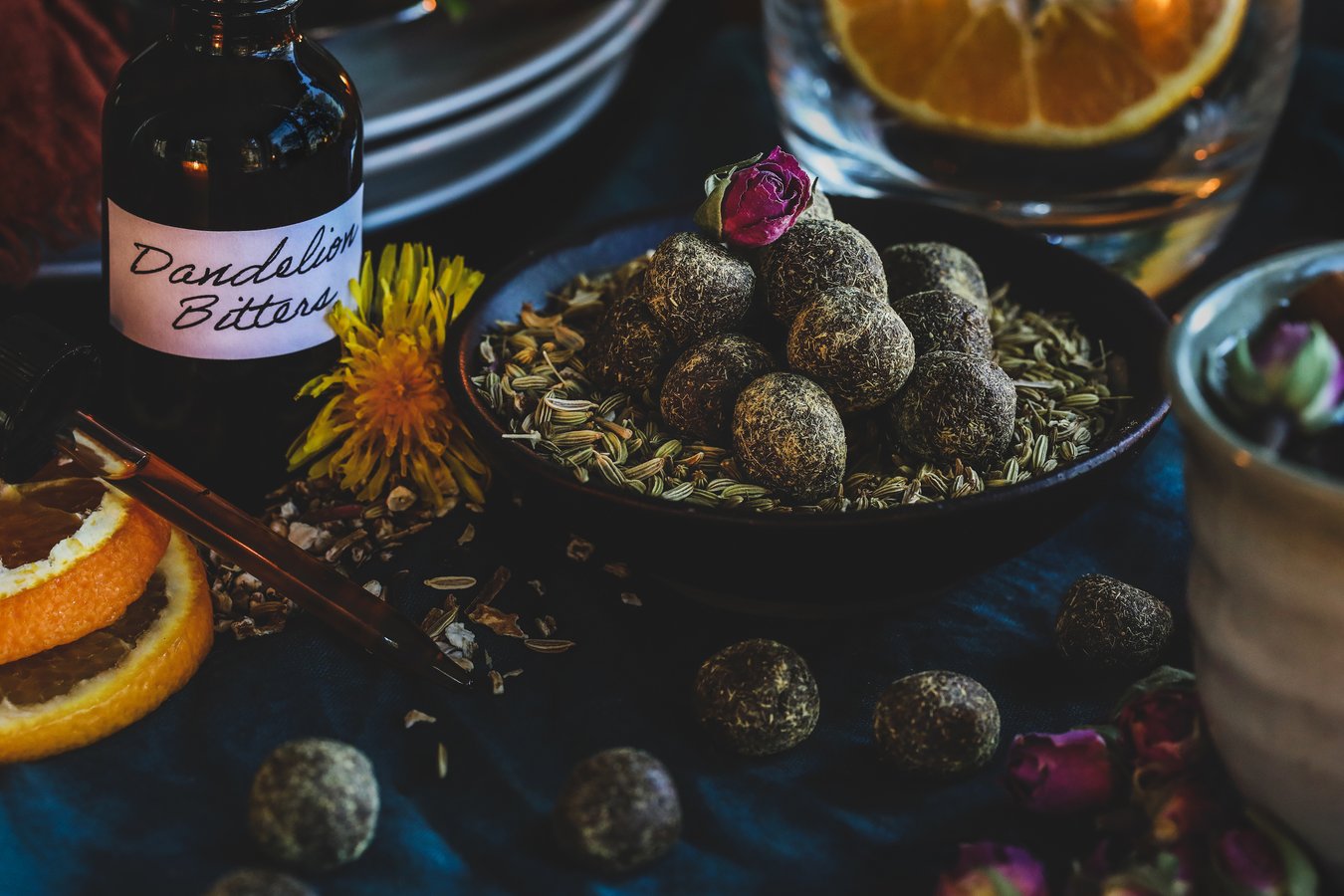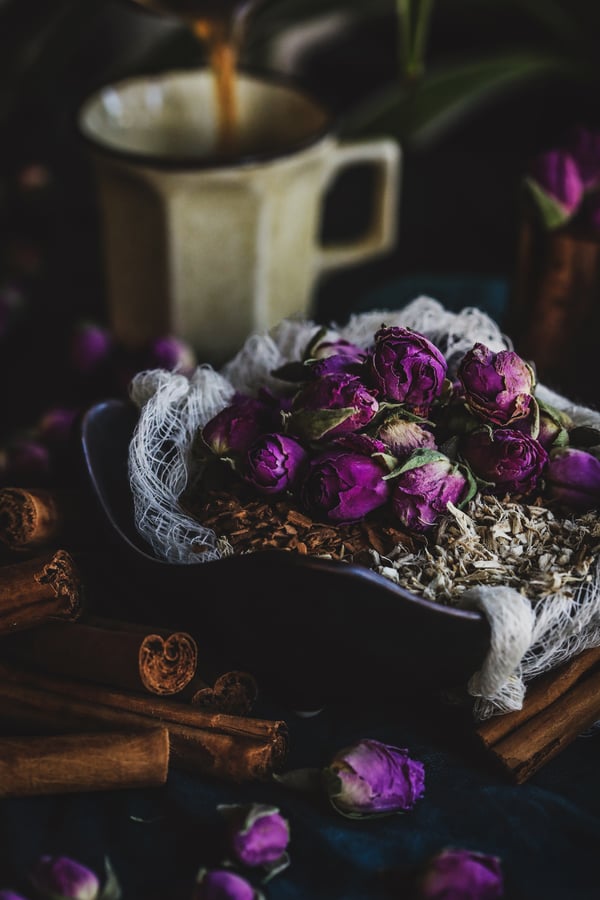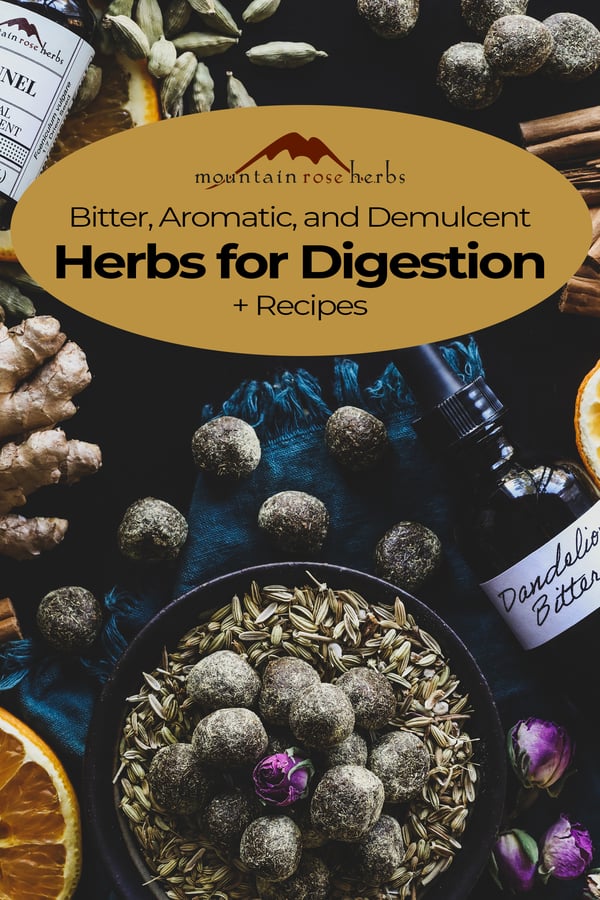This is the time of year when we start thinking about how to best support our bodies as our diets shift to heartier winter eating and those inevitable holiday meals that are just around the corner. Digestive function is a key factor in our overall health and wellness, and can be thrown off by a number of things that are part and parcel of this time of year: not just hearty cold weather meals, but also changes in our routine, less sun and exercise, the stressors (both positive and negative) of family gatherings, holiday travel, etc. This seasonal dietary and energy flux impacts our bodies in a wide variety of ways, and can particularly play havoc on our digestive system. Fortunately, when we pay attention to our own unique rhythm, we can get ahead of these factors and be prepared when our normal balance is off-kilter. There are three herbal actions that are particularly helpful: bitters, aromatics, and demulcents.
Helpful hint: The recipes below are measured in parts. If you need a refresher on what that means, see our blog The Folk Herbal Art of Measuring in Parts.
Digestive Bitters
“Bitter” isn’t always seen as a positive in American cuisine, although in the last years we are experiencing more love of bitter beers, salad greens, and of course the bitters used in cocktails. Bitters are herbs that help stimulate appetite and digestion by encouraging the production of gastric fluids and peristalsis. Just a drop is enough to set your digestive tract into healthy motion.
Another option is to make an easy, delightful bitter soda! Make the concentrate ahead so you can mix it with bubbly water when you need it later in the year.
Dandelion Bitter Soda Recipe
Makes 2 to 3 ounces.
Ingredients
- 1 part organic dried orange peel
- 1 part organic dried dandelion root
- 1 part organic cacao nibs
- 1/4 part organic gentian root
- Unflavored vodka
Directions
- Measure out herbs in proportions above to fill a 4 oz. jar one-third of the way.
- Pour unflavored vodka over the herbs until the jar is full.
- Set aside on the counter and shake twice daily for 2 weeks.
- Strain through cheesecloth or a paper coffee filter into a sterilized bottle with an airtight lid.
- Label jar and store in either your liquor or apothecary cabinet away from heat.
- Use several dropper-fulls in a pint of bubbly water with a squeeze of fresh grapefruit juice, or take a few drops straight on the tongue.
Digestive Aromatics
Aromatic herbs are the ones we love to smell, like ginger, dill, fennel, coriander, thyme, basil, and mint. Aromatics are full of volatile oils that flavor our food and also stimulate appetite. Incorporating aromatic herbs into your winter meals is a good choice for healthy digestion and many aromatic herbs are also warming to the digestive tract and carminative in nature, helping to ease the discomfort of feeling overly full or bloated.
A simple way to be prepared for those moments is by making herbal lozenges (also called pastilles). Easy-to-make lozenges give you a quick way to ingest herbs. Take a look at our video How to Make Herbal Pastilles, with Rosalee De La Forêt, for a visual guide to the process.
The after-dinner digestif lozenges below are good ones to keep on hand for the season.
Homemade After-Dinner Digestif Lozenges
Ingredients
- 4 parts organic maple or coconut sugar
- 2 parts organic cardamom powder
- 1 part organic ginger root powder
- 1 part organic licorice root powder
- 1 part organic acacia powder
- distilled water or organic fennel extract
Directions
- Thoroughly combine maple or coconut sugar with herbs in a bowl.
- Use a dropper to add one dropperful of distilled water or fennel extract at a time to the mixture, incorporating as you go.
- Keep adding one dropperful at a time until mixture holds together when squeezed, similar to the consistency of cookie dough. Be careful not to add too much liquid!
- Form into small lozenges about the size of a pencil eraser (about 1/4 inch).
- Coat the outsides of the lozenges with additional licorice root powder if desired.
- Allow to dry on a screen or plate for a few days.
- Store in a glass jar or tin. Remember to label with name and date.
Digestive Demulcents
People have used demulcents since ancient times to soothe the mouth, throat, esophagus, and stomach. Botanicals that are demulcents contain mucopolysaccharides, which are chains of sugar molecules often found in our mucus and in the fluid around our joints. The mucilaginous action of demulcent herbs triggers a reflex in the digestive tract and other parts of the body. This reflex stimulates natural, moistening secretions that soothe and relax any irritated mucous membranes they come into contact with.
Mucopolysaccharides are destroyed by heat, so demulcents should be extracted as an infusion in room temperature or cool water, rather than with heat or in an alcohol tincture form.
Soothing Marshmallow Rose Tea Recipe
Ingredients
- 3 parts organic marshmallow root
- 2 parts organic rose buds
- 1 part organic sweet cinnamon chips, or 1 organic sweet cinnamon stick, or 1/2 part organic sweet cinnamon powder
- Distilled, spring, or filtered water
- Raw, local honey, optional
Directions
- Measure out herbs in proportions above to fill a pint-size jar one third of the way—if desired, bundle the herbs in cheesecloth first.
- Fill jar with cool water and put on lid.
- Refrigerate overnight, then strain.
- Add honey to taste if you’d like a little more sweetness. Drink and enjoy!
Other herbs that have historically been used to support healthy digestive function include:
- Blackberry Root
- Boldo Leaf
- Cascara Sagrada
- Catnip
- Chamomile
- Chia Seed
- Flax Seed
- Lemon Balm
- Psyllium Seed
- Senna Leaf
- Skullcap
- Triphala
INTERESTED IN MORE SEASONAL SUPPORT FOR HEALTHY DIGESTION?
Try a Midwinter Cordial to Support Your Digestive System
You may also enjoy:
- Guide to Basic Herbal Actions
- Ayurvedic Kitchari Recipe for Seasonal Support
- Dandelion and Cacao Bitters for Digestion or Cocktails














